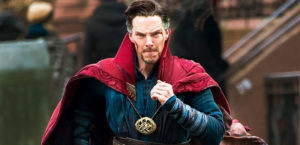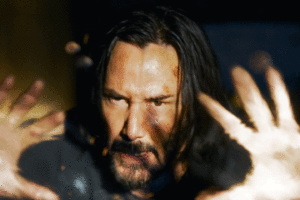There’s a 2005 episode of Doctor Who in which David Tennant’s Doctor turns against Prime Minister Harriet Jones and undermines her with six words: “Don’t you think she looks tired?” Veiled as concern, it’s barely a criticism at all but it generates sufficient uncertainty about her health and leadership to inspire a vote of no confidence. Doubt is contagious. The tenor of the current grumbling about the state of the Marvel Cinematic Universe reminds me of that. Not terrible, not failing, but don’t you think it looks tired?
It’s strange that the tipping point for sceptics has been Taika Waititi’s Thor: Love and Thunder. Any film that features Guns’N’Roses needledrops and Russell Crowe playing Zeus in the style of a sleazy taverna owner alongside a stage four cancer subplot is bound to have some tonal hiccups, and a backlash against the ubiquitous Waititi was in the diary, but it’s still a fun night at the pictures, with a winning lead, a stacked cast, a superb villain and more good jokes than most comedies. Even when the podcast The Big Picture recorded an episode “Five ways to fix the Marvel crisis”, all the panellists agreed that it was the second-best Thor movie (after Waititi’s Thor: Ragnarok) and the second-best movie of the MCU’s phase four (after Spider-Man: No Way Home). It pulled in $382m in its first week. Yet a cloud of disappointment has coalesced around it. I was asked by another publication to write an article about how badly Waititi had botched it. I replied to say that I had a really good time and would they like a more positive piece? They would not.
The thunder god has become the lightning rod for a growing sense of frustration and fatigue with the whole enterprise. With the notable exception of Peter Bradshaw at the Guardian, most of the best critics have effectively given up attempting to engage with the MCU, settling for either glib quips or weary contempt, and I don’t hold it against them. Now even enthusiasts such as the Big Picture crew are feeling restive.
Three years ago, it was all roses. In the unlikely event that Disney had decided to leave billions of dollars on the table and wrap up the MCU after Avengers: Endgame in 2019, it would have been acknowledged as the most successful franchise of all time. Not every movie was great, or even good (have you seen Thor: The Dark World?), but mastermind Kevin Feige pulled off a trick that nobody had even attempted before: a 22-movie arc culminating in the colossal pay-off of the most successful movie ever made (at least until a Chinese reissue of Avatar nudged it into second place). As the first person to work out how to translate the interconnected serial storytelling of comic books to the screen, Feige turned average moviegoers into avid completists.
So what exactly is the MCU doing wrong? Everything all at once, apparently. It’s both too frivolous (Thor) and too ponderous (Eternals); too basic (Black Widow) or too complicated (Doctor Strange and the Multiverse of Madness). It’s either overburdened with setting up characters and plot threads for future movies or insufficiently concerned with the big picture; it provides too much fan service or not enough. Back in 2014, when Edgar Wright was dropped from Ant-Man, the complaint was that the MCU’s corporate vision smothered the identity of individual directors, but now that indie darlings such as Waititi and Oscar-winner Chloe Zhao are encouraged to put their own stamp on things, other problems arise.
One thing everyone can agree on is that, thanks to Covid delays and streaming wars, there is far too much material: six movies in the past 12 months and seven Disney+ shows in the last 18. When I was a kid, I would have wept with joy to see just one decent film about a Marvel character. Now I feel like the Sorcerer’s Apprentice of Goethe’s poem who enchants a broom to fetch water and ends up almost drowning. Having worked though the most obvious characters in its IP arsenal, Marvel Studios is currently trying to get audiences hooked on the B- and C-list; I used to read far too many comic books and even I barely remember the Eternals. They are burning through talent at a ridiculous pace, hiring actors as exciting and watchable as Awkwafina, Brian Tyree Henry, Barry Keoghan, Kathryn Hahn and Florence Pugh, but not always using them wisely. Watching Moon Knight squander Oscar Isaac and Ethan Hawke in a dud story was one of the year’s more dispiriting viewing experiences. It’s like hiring a Bentley to drive to IKEA.
All this surplus generates a powerful sense of déjà vu. Too many plots rely on either processing trauma or repairing broken families and all of them must, by law, climax in an almighty dust-up involving rushed and patchy VFX. Even the winking humour, so fresh and delightful in the first Avengers movie, can feel rote. Bradshaw defines it as “a highly contained form of restricted self-satire or auto-undercutting that is always offset by the huge CGI intergalactic action scenes”.
A bigger problem is that there appears to be no centre and no direction. Cornerstone stars Robert Downey Jr and Chris Evans have bowed out, while their most obvious successor, Chadwick Boseman, has passed away. Samuel L Jackson’s Nick Fury, the original man with a plan, has disappeared. The Avengers have disbanded. Thanos is dead. Without this connective tissue, which gave even the mediocre installments a reason to be there, it’s unclear why any of this stuff matters in the long run. Everything that is supposed to raise the stakes — the time travel, the multiverse, the quantum realm, prehistory, gods, demi-gods, eternity itself, and all manner of cosmic foofaraw — ends up lowering them. “The Blip” caused half the population of the universe to vanish for five years, but we don’t like to talk about it.
Beyond the hardcore fans, the sense that you have to catch them all in order to appreciate the overall vision — indeed, the idea that there is an overall vision — has evaporated. There is at once too much continuity to keep track of and too little cohesion. Whereas the end-credit stings used to tease a larger strategy, they now feel like empty promises. Will we ever again see Brett Goldstein as Hercules or Harry Styles as Eros? Will we care if we don’t?
The MCU is currently struggling with all the ways in which movies are not like comic books. Marvel Comics has always been kept afloat by its big hitters — Spider-Man, the X-Men — while lesser characters have been regularly rebooted, replaced or temporarily shelved. The best work often arises when a new creative team is given a waning character on the verge of cancellation and allowed to take some risks. Failure is always an option on a comic-book budget, and characters can take several years to fulfil their potential. It’s taken as read that some readers will drop out as they get older while the diehards will accept the fact, inherent in a universe that has been around for 60 years, that everything changes. As Marvel scholar Douglas Wolk writes in All of the Marvels, “no creator expects that their readers are familiar with the whole Marvel story to date…What the story wants from you is not your knowledge but your curiosity.” Movies simply cannot afford to sprawl, experiment and confound in the same way.
For all that, I have to say that I’m still having a fun time at the pictures. Maybe it’s MCU Stockholm syndrome but let’s remember that it’s hard to make one effective blockbuster, let alone (so far) 29. The last movie I watched before Thor: Love and Thunder was 2003’s Terminator 3: Rise of the Machines, an astonishingly bloodless remix-cum-travesty of its two predecessors. None of the post-James Cameron Terminator sequels is better than average; the same goes for the post-James Cameron Alien movies. There are as many bad Star Wars movies as good ones and the content keeps coming. Fox’s attempts at the Fantastic Four were disasters, as were the studio’s last two X-Men films. The DC Extended Universe is chaos. The Transformers franchise is almost entirely dreck. Even now that the writers and directors of the last two Avengers movies have re-teamed for the Netflix spy thriller The Gray Man, its Rotten Tomatoes score is lower than any MCU movie bar Eternals.
You get the picture. I’ve noticed that when friends with older children seek recommendations for solidly enjoyable family movies, MCU is always the no-brainer suggestion because even the worst entries have some memorable moments and a base level of competence. If Kevin Feige is like an ambitious juggler who drops a ball every now and then, most of his competitors are regularly left empty-handed.
Feige’s current problems, then, are imperial ones. He runs an overextended superpower which has probably already peaked but cannot stop growing. It can’t be healthy for a single franchise to exert such hegemonic dominance over the box office and the cultural conversation but nothing looks capable of supplanting it. The curious upshot is that the MCU is too big to fail and yet too big to succeed to the extent that it did with Infinity War and Endgame. While it’s not beyond the wit of Feige and his collaborators to braid all these loose threads into a satisfying narrative rope at some point, that task is becoming exponentially more difficult. The most obvious solution to MCU exhaustion would be for it to slow down and do less, but empires, famously, aren’t very good at that.
Disclaimer
Some of the posts we share are controversial and we do not necessarily agree with them in the whole extend. Sometimes we agree with the content or part of it but we do not agree with the narration or language. Nevertheless we find them somehow interesting, valuable and/or informative or we share them, because we strongly believe in freedom of speech, free press and journalism. We strongly encourage you to have a critical approach to all the content, do your own research and analysis to build your own opinion.
We would be glad to have your feedback.
Source: UnHerd Read the original article here: https://unherd.com/




